Unpleasant smell from the mouth of children, which is not eliminated after hygiene procedures, may indicate various diseases or malfunctions in the body. This phenomenon is called “ozostomia” or “halitosis”. The smell from the mouth can be varied - sour, sweetish, putrid, yeasty, acetone. If your child's odor is persistent, this is a good reason to see a doctor.
Causes and elimination of sour breath in a child under 1 year old
In children infancy The digestive system is not yet sufficiently formed, and the basis of their diet is milk, therefore, in children under the age of 1 year, a slight pleasant milky smell from the mouth is considered normal.
If the smell begins to be stronger and the odor becomes unpleasant, this may indicate that the baby has increased acidity or has reflux. These are far from the only reasons for the appearance unpleasant odor in children, so you should definitely show the child to doctors.
If your baby is breastfed
The most common smell is sour in infants. The diet of children of this age usually consists of breast milk. An infant's imperfect digestive system can sometimes provoke the appearance of a foul, sour odor. This can occur after regurgitation and belching. Sometimes this smell can appear in the morning, but this is already a feature human body. If the baby’s sour breath does not go away, then you should absolutely not ignore this problem. The child should be examined immediately to find the cause of bad breath.

The sour smell appears due to the proliferation of microorganisms in the oral cavity, which inhabit the body of every living creature.
The microflora consists of both “good” and “bad” bacteria. There are much more “good” microorganisms than “bad” ones, and when this balance is disturbed and the “bad” ones begin to dominate, then an unpleasant odor appears. The proliferation of pathogenic bacteria can be caused by the following reasons:
- weakness of the immune system;
- a consequence of hypothermia;
- fasting;
- overeating;
- overwork and fatigue;
- Acute respiratory infections and colds.
Lactic (“good”) bacteria begin to actively fight for survival, as a result of which the breath becomes stale, with a pronounced sourness. Pleasant and unique smell infant can spoil the pungent odor from his mouth, which can be caused by:
All these reasons can be easily eliminated; you just need to adjust the mother’s diet, rinse and moisten the nose, give the child something to drink, and the smell will go away. In case of dysbacteriosis or other diseases, you should contact your pediatrician, who will refer the child to specialized specialists.
If the baby is “artificial”
Babies who are deprived of mother's milk and are fed with special formulas may have problems with bad breath due to a lack of fluid in the small body or problems with the ENT organs. Often the cause of a sour smell is a runny nose and inflammatory processes in the maxillary sinuses (sinusitis). Bad breath can also be caused by sour food leftovers in a child's mouth if parents do not properly maintain oral hygiene.
“Artificial babies,” just like those babies who are breast-fed, often spit up, especially in the first months of their life. It can also cause bad breath. It is important to ensure that the child receives the required amount of formula and does not overeat.
Poor hygiene as a factor in bad oral odor
 Every person with early childhood taught that the morning should begin with brushing your teeth and rinsing your mouth. Daily hygiene helps keep your teeth healthy and your breath smelling fresh and pleasant. You can teach your child to take this procedure seriously if you start teaching him from infancy.
Every person with early childhood taught that the morning should begin with brushing your teeth and rinsing your mouth. Daily hygiene helps keep your teeth healthy and your breath smelling fresh and pleasant. You can teach your child to take this procedure seriously if you start teaching him from infancy.
If you do not keep your children's mouth clean, leftover food in the mouth creates an ideal environment for the growth and reproduction of pathogenic microorganisms. It is necessary to observe the rules of hygiene from birth, even for those children who do not yet have teeth. For this purpose, special silicone brushes have been developed, specifically designed for these purposes. If such a device is not at hand, after each feeding you should give the baby a drink of clean water, which will wash away the remaining milk or formula.
From the moment the first tooth erupts, the child’s oral hygiene becomes even more thorough, since we are talking about the state of dental health. It is a mistake to believe that if baby teeth are damaged by caries, they will fall out, and the molars will be healthy. Everything in the body is interconnected, and it is the condition of the baby teeth that determines how healthy the permanent teeth will be.
Diseases that cause unpleasant odor
If a child has bad breath, this may not only be a consequence of improper or insufficient oral and dental hygiene, but also a symptom of various diseases.
First, it is important to find out the reason why your breath smells so bad in order to begin treatment in a timely manner and eliminate this defect. Diseases of both the oral cavity and the gastrointestinal tract can provoke an unpleasant odor.
Caries and other dental problems
In any case, bad breath is a consequence of the proliferation of pathogenic bacteria. Often the focus of the stench is in the child’s mouth. One of the most common causes of halitosis is caries. In this case, bacteria multiply in the diseased areas of the teeth. Caries in young children can occur due to poor oral care or abuse of sweets and carbonated water.
This category of diseases also includes thrush (candidiasis) and stomatitis, which are also often found in children under one year old and a little older. These unpleasant and painful diseases that cause an unpleasant sour odor can be eliminated by contacting a pediatric dentist and following all his recommendations and prescriptions.
Diseases of the ENT organs
If caries in a child is not detected as a result of a medical examination and the source of the stench is not found, the child should be shown to an otolaryngologist. The cause may also be diseases of the ENT organs:

Gastrointestinal diseases
Diseases of the gastrointestinal tract can also cause bad breath in a child. The most common are the following:
- inflammatory processes in the stomach;
- gastritis;
- initial stage of peptic ulcer;
- outflow of bile into the esophagus (reflux);
- helminth infection;
- constipation or diarrhea;
- dysbacteriosis and others.
Additional characteristic symptoms such as vomiting, nausea, heartburn, frequent belching, various impurities in the stool, bloating, etc. may indicate gastrointestinal diseases. If you respond in time to the appearance of an unpleasant, pungent odor from a child’s mouth, you can detect the development of serious diseases in the early stages and begin effective treatment, which increases the chances of success several times.
Any adult remembers how nice little children smell. With milk. It is the lactic acid bacteria that work hard, preventing any microbes from developing in the baby’s mouth. However, such an idyll does not always happen; the child’s breath can be unpleasant. We will try to figure out what this is connected with, how to identify and eliminate the cause. In general, caries is often considered the main cause of bad breath. But this kind of trouble also happens to babies (infants) who don’t even have teeth yet. This means there are many sources of bad odors, and today we will talk about the most common ones.
Causes of unpleasant odor
It’s worth saying right away that any person – adult or child – has a huge number of bacteria in the mouth, the majority of which are not pathogenic. Pathogenic, or pathogenic, microorganisms, in the presence of conditions favorable for their development, multiply very quickly and cause various diseases in humans. As a result of a slight weakening of the immune system (as a result of taking medications, overwork or stress), pathogenic microbes are activated, causing the appearance of a bad odor.
Bad breath in the morning is also associated with bacteria. At night, saliva production decreases significantly, which is an excellent opportunity for the proliferation of these microorganisms. Hence the unpleasant morning smell.
- Food
Some types of food can spoil the freshness of your breath for a long time. Eating foods with a strong and unpleasant odor invariably contributes to the development of bad breath in a child. This can confidently include:
- carbohydrate foods that cause a rotting smell due to the body's slow processing of them.
- all kinds of fruits and vegetables that cause the fermentation process.
- onion and garlic.
- sweet foods, which help pathogenic microorganisms multiply.
- products that emit a specific odor when digested (corn or cheese, for example).
- Insufficient hygiene
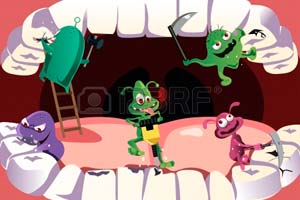 There is no need to prove anything here. Improper or insufficient oral hygiene will invariably cause a foul odor.
There is no need to prove anything here. Improper or insufficient oral hygiene will invariably cause a foul odor.
Please note that children need to brush not only their teeth, but also their tongue. For “toothy” children, this can be done with a brush while brushing their teeth; for infants, this can be wiped with damp gauze or cleaned with a teaspoon.
Teach your child to brush his teeth properly, cleaning all the spaces between them, and rinse his mouth after eating.
- Breathing through the mouth
For some reason, some children are accustomed to breathing through their mouths. Because of this, the oral mucosa dries out, which also causes an unpleasant odor. The fact is that saliva can destroy microbes, and its absence is a very favorable factor for the proliferation of bacteria. Insufficient saliva production may be a pathological condition of the body, or may occur as a result of dehydration or taking certain medications.
- Stress
Constant worry or being under stress can ruin the freshness of your breath, since in such situations the secretion of saliva decreases.
- Not drinking enough
Oddly enough, this is one of the reasons for the strong odor from a child’s mouth. By drinking enough liquid, your baby will rinse his mouth of food debris and improve the digestion process. Therefore, children over one and a half years old should drink about 1.5 liters of water per day. Please note - it is pure, spring water, and not juices or compotes!
- Foreign body
Little explorers can stick anything up their noses. Before looking elsewhere for the cause of bad breath, check your baby's nose. It is possible that you will find a foreign body there that caused the smell.
- Digestive system dysfunction
An upset stomach and increased gas production can cause a specific odor in a child's mouth, because... Gastric juice accumulates in the body and the acidity level changes. In children, these problems most often arise during periods of growth: for girls it is 6-7 years old and 10-12 years old, for boys it is 4-6 years old and 13-16 years old.
- Respiratory diseases
Tonsillitis (inflamed tonsils, tonsils) leads to the accumulation of actively reproducing pathogens, suppuration, mucus formation, and can often be accompanied by a very unpleasant odor.
Bronchitis. Accumulates in bronchi and bronchioles a large number of sputum that comes out when you cough and has an unpleasant odor.
A runny nose of an infectious or allergic nature is always accompanied by abundant formation of purulent masses that decompose under the influence of bacteria and have an extremely unpleasant odor.
Bad smell as a symptom of disease
Bad breath can indicate the presence of certain diseases that have not yet manifested themselves in any other way.
- Rotten smell
Inflammation of the stomach in most cases is accompanied by a rotten smell that appears in the mouth. The same smell can occur due to gastritis, problems with the esophagus, increased gas formation, dehydration due to intestinal disorders.
The smell of rotten eggs also accompanies various liver diseases.
- Sour smell
With increased stomach acidity, your baby will emit a sour smell from his mouth. An acidic smell may also indicate a nuisance such as the release of gastric juice into the esophagus.
- The smell of rot
The first on the list, of course, is caries. But bad breath can appear as a result of diseases such as: periodontal disease, stomatitis, tonsillitis, periodontitis, herpes, pharyngitis and others.
This odor is caused by the accumulation of bacteria in the mouth or mucus in the nasopharynx. A coating on the tongue can also give off a bad odor, the cause of which can only be determined by a specialist.
A child may smell rotten even during a runny nose. The reason is simple - the same dry mouth (after all, the nose is stuffy, we breathe incorrectly) and mucus accumulated in the nose.
Inflammation of the adenoids is often accompanied by the smell of pus. Tonsils (tonsils) can accumulate food debris in their folds, which also invariably leads to a bad smell.
A rotten smell comes from the baby and with low acidity of the stomach.
- Sweet smell
Eating foods rich in starch, taking antibiotics, radiation therapy, and a temporary decrease in immunity can cause a fungal infection (candidiasis or), which manifests itself as white spots in the mouth. In this case the smell will be sweetish.
The sweetish smell of raw liver is a sign of hepatitis or cirrhosis. A child’s mouth smells like liver in other pathological conditions of this organ.
- Ammonia smell
The smell of urine is absolutely unpleasant, but it can indicate existing kidney problems. The stronger the smell, the more problems have accumulated in the baby’s body. This smell occurs because the function of the kidneys is impaired, and they are not able to remove waste products in full.
- Smell of iodine
The smell of iodine from the mouth is observed in those babies whose bodies are oversaturated with this microelement. This may be due to a long stay by the sea, for example. Sometimes iodine odors in the mouth are caused by high sensitivity child's body to this substance or intolerance to it. In any case, your child's breathing like this should be the main reason for a full thyroid examination.
- Acetone smell
Often colds accompanies the smell of acetone from the mouth of children. The same smell occurs with diabetes mellitus, acetone syndrome and problems with the thyroid gland. You need to see a doctor.
- Other smells
Various “residents” inhabiting the child’s body can also cause bad breath. This refers to pinworms, roundworms and lamblia.
Even a metabolic disorder in the body can ruin a child’s breathing. With such disorders, the crumbs will smell boiled cabbage or even manure from the mouth.
Ways to get rid of unpleasant odor
First of all, the child needs to be examined (visit an ENT doctor, dentist, pediatrician) to exclude or confirm the presence of any of the diseases listed above. In this case, measures to eliminate bad breath will be reduced to treating the disease.
If unpleasant-smelling breath is not associated with a disease, then you must first eliminate the irritant and teach your child the rules of oral care.
- We follow the rules of hygiene
From an early age, teach your baby to brush his teeth twice a day. Rinsing your mouth after eating should also become a habit for your baby. For more fun, you can buy your child a “tasty” mouthwash at the pharmacy or use chamomile or sage infusions. ( see links to articles above)
- Limit sweets
We understand that for some this is almost impossible, but you have to try. After all, the “pleasantness” of your child’s breathing depends on your persistence, and there will be little chance for caries. This does not mean that the child should forget about sweets forever. Not at all. You just need to try to replace them with natural products.
For example, any candy can be replaced with honey (if the child does not have it, of course). You can also offer your child fruit instead of sweets. Ordinary apples have excellent qualities for cleaning the oral cavity. In our case, any other sour fruits are suitable, as they increase the process of salivation and help eliminate the nasty odor.
- Drinking regime
It must be observed, and this is not discussed. But you need to approach the choice of drinks with all responsibility. The child's diet should consist of natural products– compotes, juices and tea. But it is best to drink regular drinking water. Any carbonated drinks should be prohibited - they cause fermentation in the body and, accordingly, bad breath.
- Psychological attitude
The problem of bad breath is very delicate and even painful for many children. It is important to create a positive attitude and focus on a good result. Explain to your child that it is not he who is to blame for the problems, but the state of his body, and do not forget to mention the importance of brushing his teeth.
Try not to voice the problem in public; the child may develop a complex or resentment towards you.
Now you know that the cause of a child’s bad breath can be either a serious illness or completely harmless temporary factors. In any case, it is necessary to identify the “culprit” of the bad odor immediately and take timely measures to eliminate it. Remember that any problems in the baby’s body left unattended will bring you and your baby many problems in the future.
Video
Pediatrician, candidate of medical sciences, mother of three children Tatyana Prokofieva talks about the causes of the smell
Komarovsky tells
Well, for everyone, both children and adults, how to get rid of bad breath?
Sometimes it happens that in the absence of obvious illnesses, a child has an unpleasant odor coming from his mouth. Of course, parents immediately wonder what causes this manifestation, whether it signals an infection, and what to do in such a situation.
First of all, it is important to find out the root causes of bad breath. The following factors may contribute to this:
- active movement of the child, increased sweating;
- dry air in the appropriate room where the baby is most often;
- the presence of acute respiratory illnesses;
- chronic inflammation of the respiratory organs;
- development of caries;
- allergic rhinitis;
- inflammation of the adenoids.
Sometimes bad breath has nothing to do with diseases of the digestive organs. It occurs due to the condition of the oral mucosa. This problem is relevant for children under 14 years of age. It is advisable to look for the cause of the manifestation in the oral cavity or in the nose. Therefore, it is important to find out why bacteria, which should continue to be suppressed by salivary components, actively develop.
What does bad breath mean in a child?
The appearance of such a sign can indeed indicate specific diseases of the child’s body, which will manifest themselves over time.
Smell of iodine
This phenomenon occurs in those children whose bodies are simply oversaturated with this element. This is possible if the child spends a long time at sea. Iodine odors may indicate intolerance to this substance or high sensitivity to it.
It should be noted that such a manifestation should be a reason for examination of the thyroid gland.
Sour, fermentation smell
If a child has increased stomach acidity, a sour, fermented smell emanates from the mouth. This may signal that stomach acid is being released directly into the esophagus.
Smell of acetone
Colds are usually accompanied by the smell of acetone emanating from the mouth. This condition is also inherent in diabetes mellitus, thyroid disorders, and acetone syndrome. Of course, in such situations it is advisable to contact a medical facility.
Acrid, putrid odor
In the presence of caries, a putrid, acrid odor occurs. It can signal stomatitis or periodontal disease, herpes or sore throat, pharyngitis or periodontitis. This manifestation is due to the accumulation of mucus in the nasopharynx or bacteria in the oral cavity. Plaque on the tongue may also be the cause.
Only a qualified doctor can determine what causes this. A pungent odor may also appear with a runny nose. The cause is mucus accumulated in the nose, as well as drying out of the mucous membranes in the oral cavity. The child’s mouth smells like pus when the adenoids are inflamed or the stomach has low acidity.
Rotten egg smell
In most cases, during inflammatory processes in the stomach, the mouth smells like rotten meat. This may signal the development of gastritis, problems with the esophagus, intestinal dysbiosis, dehydration, and increased gas formation. This smell also accompanies liver disease.
To get rid of this unpleasant problem, the child needs to be examined. As a rule, they start with a visit to an ENT specialist, pediatrician, or dentist. This allows you to exclude or confirm the list of ailments listed above. Measures to eliminate the corresponding symptom come down to treating the disease, that is, the root cause of the manifestation.
In some situations, bad breath has no connection with illness. Then you need to eliminate the irritant and teach the child proper oral care.
Teeth should be brushed twice a day. This should become a habit for the child. After eating you need to rinse your mouth. You can buy mouthwashes with different flavors for your baby, or use sage or chamomile infusions.
The next step is to limit sweets. For some children this is almost impossible. But you need to explain to your child that it is precisely these foods that make their breath stale. It is better to find a worthy replacement for sweets. Natural products are suitable for this. These include honey, raisins, dried apricots, prunes and so on. In addition, you can offer your baby apples - these fruits clean the oral cavity well. Sour fruits that increase salivation are also suitable - they will help eliminate unpleasant odors.
The drinking regime deserves special attention. The choice of drinks should be approached responsibly. The diet should be based on compotes, teas, juices. However ideal option will become purified drinking water. Any soda should be prohibited. After all, they are the ones who often influence bad breath.
The psychological attitude is also important. For many children, the problem of bad breath is very painful. Therefore, you need to create a positive attitude, as well as a focus on further results. You should explain to the child that it is not his fault for the problem, but the state of the body. At the same time, it is worth emphasizing how important it is to brush your teeth. You cannot voice the problem in public, because the child may develop a complex or a strong resentment.
To get rid of an unpleasant odor, it is important to restore salivation and eliminate possible dental problems. Your child should regularly drink purified water with lemon. The air humidity in the room should be about 65%. It is important to check the condition of your teeth. If your nose is breathing poorly, you can rinse it with saline solution. This procedure is acceptable twice a day.
It should be understood that the most important thing is to identify the root cause of the unpleasant odor. This will allow you to choose the optimal solution to this problem. There is no need to panic, because most often, bad breath can be eliminated by restoring steam salivation, which prevents the mucous membrane from drying out, and by the humid climate in the apartment where the baby is. Of course, examining the child in a medical facility will be beneficial - it will help identify the cause of the unpleasant odor and promptly overcome such manifestations.
Especially for -Alexander Suslov
Children usually smell very nice, especially their own - any parent will tell you that. But it often happens that suddenly, in the absence of any obvious illness, an unpleasant, pungent odor begins to be felt from the child’s mouth. Why is this happening? And does this smell from the child’s mouth indicate the development of some serious infection? And the main thing that worries parents is how to get rid of such a problem?
A strong bad breath, including in a child, is called halitosis (or halitosis) in medical terms. Unfortunately, it can be observed in children of any age (sometimes even in infants), and, accordingly, cause a “bouquet” of worries and worries in parents. What if the sharp, nasty odor from a child’s mouth really is a sign of a serious illness?
Causes of bad breath in children
Where does bad breath come from? Doctors have found that the main “producers” of the unbearable sulfur-ammonium “amber” are special bacteria, the very essence of whose existence is to break down the proteins we get from food.
Moreover, this act of splitting occurs in us, both adults and children, directly in the mouth. Actually, this is the first step along the long digestive tract. During the decomposition process, some sulfur-containing compounds are inevitably formed, which, in fact, emit a terrible odor.
However, nature foresaw this moment and added a special component to human saliva (namely, a specific type of streptococcus), which in theory should neutralize the unbearable “aroma” of sulfur. But in practice there are often plenty of examples where this does not happen. Typically for two reasons:
- Either there is too little saliva in the mouth;
- Or there are too many bacteria in the mouth that break down proteins (and there are too many of them when they have something to eat - that is, when food debris or dried mucus constantly accumulates in the mouth).
In adults, there may be a third explanation - there is enough saliva in the mouth, but it does not contain that same “sanitary” streptococcus. However, this cause of bad breath has nothing to do with children - their saliva always has the “correct” composition.
So, the problem of bad odor is always related to saliva. And attempts to “link” bad breath in a child to problems with the stomach, gall bladder or intestines are completely unfounded. The problem of bad odor in the mouth concerns only the oral (and sometimes also nasal) cavity and is limited exclusively to it.
Factors that contribute to the development of an unpleasant odor in a child:
- Dry air in the room where the child lives;
- The child moves actively and sweats a lot (which also contributes to dry mouth);
- Any (during any cold or flu, the respiratory tract becomes dry and an excess amount of mucus forms in them - on the one hand, these are additional proteins for bacteria, the breakdown of which produces sulfur compounds, on the other, an obstacle to the “work” of salivary streptococcus);
- Any chronic inflammation in the respiratory tract (whether it be, or, or);
- Bad teeth with signs of caries or periodontal disease;
- (which also causes accumulation of excess mucus in the nasal and oral cavities);
Bad breath in a child: a symptom of a disease or an incorrect menu?
In reality - neither one nor the other! Bad breath has nothing to do with digestion, or with any infections, or indeed with anything other than the condition of the oral mucosa.
So, in almost 100% of cases when a child has bad breath (up to 13-14 years old), this is not related to any serious illness. Moreover, this phenomenon is in no way connected with any other area of the child’s body except the oral and nasal cavity. Parents, do not be alarmed: no matter how sharp and bad the child’s breath suddenly smells, everything is still fine with the gastrointestinal tract system. The cause of “amber” should be sought exclusively in the mouth, or, in extreme cases, in the nose.
So if you went to the doctor with a problem of bad breath in your child, and he prescribed you a “bouquet” of tests (demanding to study feces, urine, blood - whatever), this doctor, to put it mildly, is mistaken. Everything that is “produced” by the body below the level of the mouth is completely pointless to study in this case.

There is only one thing that needs to be clarified: why does the baby develop bacteria that should normally be suppressed by the components of saliva? Perhaps there is not enough saliva... Or perhaps there are too many bacteria (for example, if the teeth are rotten). It is also possible that the child’s adenoids are inflamed - mucus accumulates on them and, undergoing the process of rotting, is a source of unpleasant odor.
How to eliminate bad breath from a child
To eliminate bad breath in a child, it is necessary to solve two main problems: eliminate dental problems (if any) and restore salivation. To do this you should do the following:
- periodically give the child water with lemon to drink;
- organize a humid climate in the room (air humidity should be between 60-70%);
- check the condition of your teeth at the dentist;
- if the nose does not breathe, rinse the nose with saline solution (and do this several times during the day);
- check with an otorhinolaryngologist the condition of the child’s adenoids;
So, by and large, contrary to the popular belief of parents, bad or pungent odor from a child’s mouth is not a medical problem - there is nothing special to treat. The only thing that should be done is to check the condition of the baby’s teeth and tongue (whether food debris accumulates there), check to see if there is an inflammatory process in the throat, and finally find out whether the child’s nose is breathing normally.
If the baby is in perfect order on all these points, then a humid climate in the house will definitely help solve the problem of bad breath, which will restore proper salivation in the child and prevent the mucous membrane from drying out. That, in fact, is all the wisdom of dealing with unpleasant odors!
Bad breath in an infant is extremely rare. The occurrence of a bad odor may indicate improper care or malfunctions. internal organs. To caring parents you need to know everything about the phenomenon of bad breath.
Healthy oral cavity
Microorganisms live in the oral cavity of a person of any age. These are aerobic bacteria, microscopic fungi. In children under 1-2 years of age, the microflora is formed mainly by lactobacilli. They perform a protective function and prevent harmful microorganisms from developing in the mouth. Normally, a baby's breath smells like milk.
Bad breath is a reason to consult a pediatrician
Saliva plays an important role in the oral cavity for a number of reasons. It has a slightly alkaline environment, which creates favorable conditions for the functioning of the digestive enzyme amylase. Saliva moistens mucous membranes and has antibacterial properties.
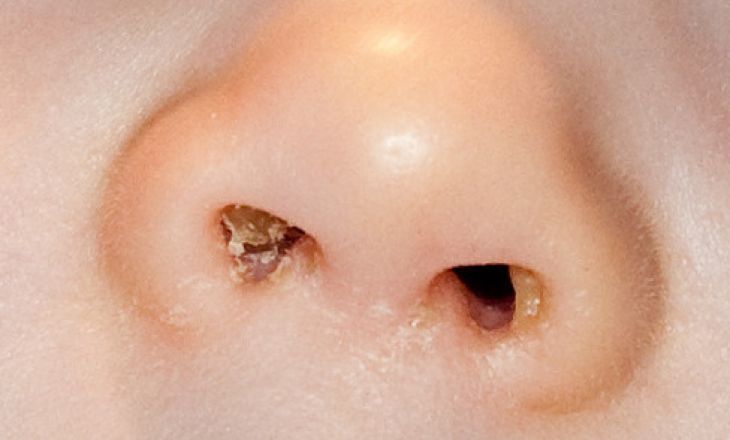
Impaired new breath causes dryness and odor
Saliva maintains the balance of oral microflora.
What does the full functioning of the salivary glands depend on?
The effectiveness of the salivary glands depends on many factors:
- Age. The glands work best in young children. In old age, saliva secretion decreases.
- State of the nervous system. IN stressful situations salivation may sharply decrease.
- Hormonal background. The secretory function of the salivary glands depends on the concentration of certain hormones.
- Air humidity. In dry climates, the effectiveness of salivation decreases.
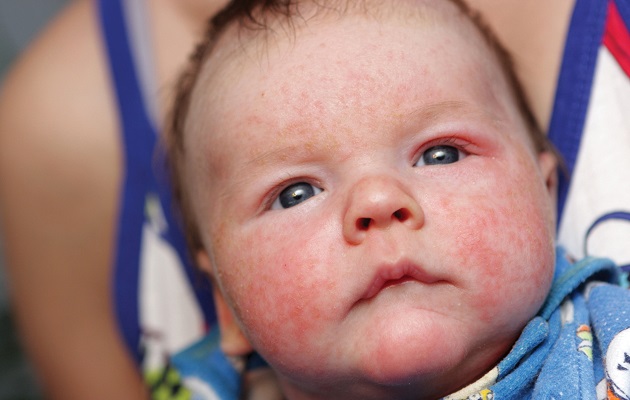
Allergies in a child - the cause of dryness and odor
Pathologies of saliva secretion are very rarely observed in infants.
Sometimes the baby experiences dry mouth. This can cause halitosis (the dental term for bad breath).
Main causes of bad breath in babies
Bad breath in infants may occur for the following reasons:
- Imbalance of microflora in the mouth. When your baby is already teething, bad breath may appear due to poor hygiene. The disorder may also be related to diet and medications.
- Lack of saliva. There are many reasons for the violation. Dry mouth is associated with improper care of the baby or diseases of the nasopharynx.
- Inflammatory diseases of the throat.
- Disturbances in the digestive tract.
The smell from the mouth of an infant is usually not strong, but it is easy to distinguish from the norm. Each cause of halitosis in newborns needs to be understood in detail.
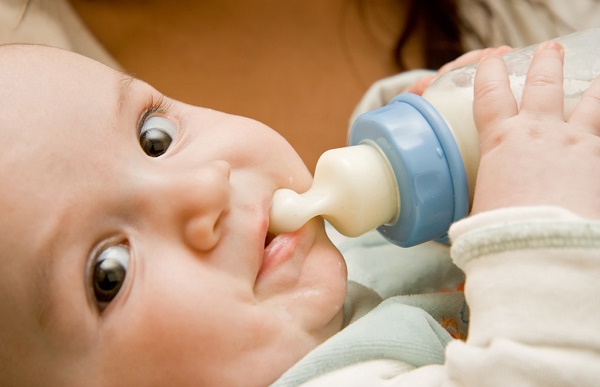
Artificial feeding is the cause of microflora imbalance in the mouth
Why is the balance of oral microflora disturbed?
In a child who is only breastfed, an imbalance of microflora is very rare. Mother's milk creates a favorable environment for lactobacilli.
Causes of microflora imbalance
- Mother during breastfeeding took antibiotics. During antibiotic treatment, pediatricians recommend switching the child to dry formulas to avoid negative influence drugs on the body.
- Artificial feeding. Modern dry formulas are close in composition to breast milk. But the composition baby food may vary from manufacturer to manufacturer.
- Cold, viral or bacterial infection. The baby’s immunity has not yet been formed, so any invasion of foreign microorganisms can cause an imbalance of microflora in the mouth and halitosis.
- Treatment of a child with antibiotics. Antibiotics kill not only harmful but also beneficial bacteria, and they also promote the proliferation of microscopic fungi.
- Start of complementary feeding. When a child begins to consume other plant and animal foods in addition to breast milk, the body gets used to it for some time. The baby may not chew completely or spit up a little. Leftover food will rot in the oral cavity, which can cause short-term halitosis and the appearance of plaque on the tongue.
Teething also provokes an imbalance of microflora, this is associated with stress and changes in the functioning of the salivary glands.
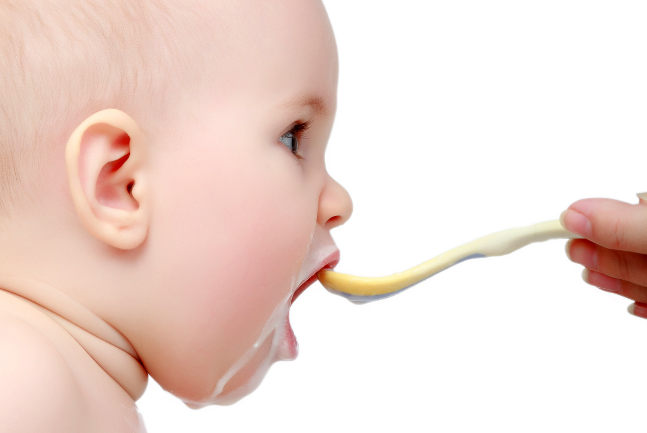
Starting complementary feeding causes imbalance
Therefore, halitosis may appear during this period. Teeth create a lot of new worries for parents. To avoid halitosis, you need to start brushing your teeth immediately after teething.
Causes of dry mouth in children
Saliva has a disinfecting effect, moistens the membranes of the mouth, and is involved in the digestion of carbohydrates. If salivation is poor, this becomes the cause of halitosis. Why does a baby have dry mouth?
- Impaired nasal breathing due to constant crying or inflammation in the nasopharynx, nasal congestion.
- Insufficient air humidity. In the room where the child sleeps, the humidity should be at least 50%.
- Insufficient fluid intake. The child should drink regularly. Babies can be given diluted juices.
- Stressful situations can cause short-term disruption of salivation. Therefore, if a child cries, sleeps restlessly or is scared, he needs to be given water more often.
Halitosis due to gastrointestinal disorders
The development of organs and tissues of the gastrointestinal tract in an infant is not yet complete. Therefore, halitosis due to digestive disorders in children is not uncommon. Most often, an infant’s breath smells for the following reasons:
- Intestinal dysbiosis. Occurs after taking antibiotics or stopping breastfeeding.
- Violations of sphincter tone, reverse flow of stomach contents into the esophagus or pharynx. Then a sour smell of incompletely digested food appears from the child’s mouth.
- Pancreatitis. Pancreatitis rarely develops in infancy, but such cases exist in pediatric practice. With pancreatitis, in addition to an unpleasant odor, a child will experience abdominal pain and bowel movements.
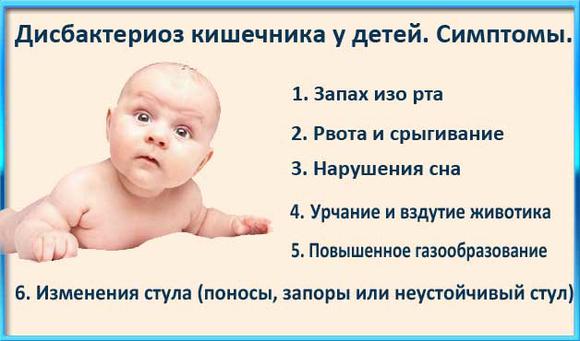
Intestinal dysbiosis is the most common reason halitosis
If there are gastrointestinal problems, the child will experience changes in the quality of stool (diarrhea, constipation), bloating, gas, and belching. These symptoms do not always mean the presence of pathology, but should force parents to go to the hospital. To identify the disease, you need to take a stool and finger prick test.
You cannot feed your child enzyme preparations or probiotics on your own. Treatment should be prescribed and monitored by a pediatrician.
Your baby may have bad breath after waking up. This means that lumps of food remain in the mouth, creating a favorable environment for the proliferation of putrefactive bacteria. To get rid of the aroma, you need to clean the coating from the tongue with gauze moistened with soda solution or plain water, and give the child something to drink.
Inflammatory diseases and halitosis
Tonsillitis (tonsillitis) is an inflammation of the tonsils, which is provoked by staphylococci or streptococci. This disease occurs rarely in newborns. But children 2–3 years old suffer from sore throat. The activity of pathological microorganisms leads to loosening of the surface of the tonsils. Leftover food begins to get stuck in them and rot. This can lead to bad breath.
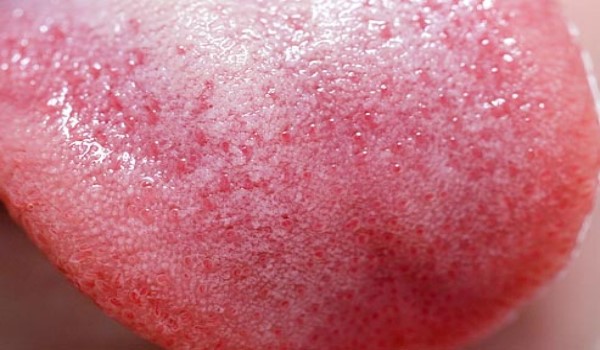
Stomatitis is the cause of odor
Children from the age of three months begin to put their hands, rattles and anything that doesn’t fit into their mouths. If dirty objects get into the mouth, stomatitis (inflammation of the oral mucosa) may develop. Stomatitis is not the cause of bad breath.
Bad breath and worms
There is a widespread belief among parents and grandparents that bad breath is a symptom of a helminthic infestation in a child. This opinion is wrong.
Worm infestation does not cause bad breath.
Which doctor will help solve the problem of halitosis in children?
Persistent halitosis in an infant should be a reason to seek help from a specialist.
- Pediatrician. A general specialist will examine the baby, take an anamnesis, and prescribe stool and blood tests. If tests indicate the presence of pathologies, you will need to consult with specialists.
- Otolaryngologist. Deals with diseases of the nasopharynx.
- Gastroenterologist. It will help get rid of gastrointestinal disorders.
- Dentist. Assess the condition of the oral cavity.
Treatment is also prescribed by a doctor, taking into account individual characteristics child's body. Once the cause is eliminated, bad breath should disappear.
If no diseases that cause the unpleasant odor are found, you can try to get rid of the problem yourself.
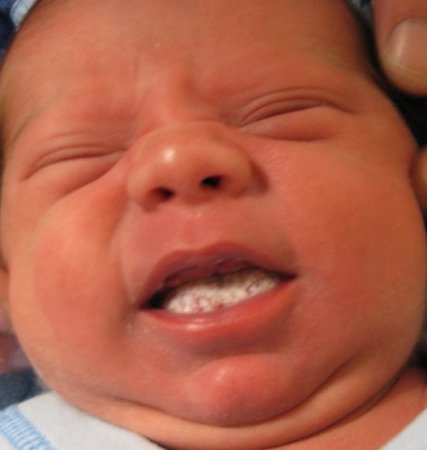
Thrush is always accompanied by a sour odor
How to get rid of bad breath in a baby
To prevent halitosis from appearing in a child, you need to follow several recommendations:
- Cleaning teeth and tongue. Small teeth can be cleaned with a silicone brush – a finger attachment. Plaque from the tongue can also be removed with a brush or a moistened piece of gauze.
- Careful selection of baby food. Purees and porridges should not contain starch. You also need to exclude sweets from your diet.
- Humidifying the air in the room. To maintain air humidity, you need to purchase a special humidifier. It is better not to turn on heaters in the room; they dry out the air too much.
- Drink regularly. The child should often be given plain water and diluted juice.
- Timely treatment of colds.
- Regular medical examinations with a pediatrician.
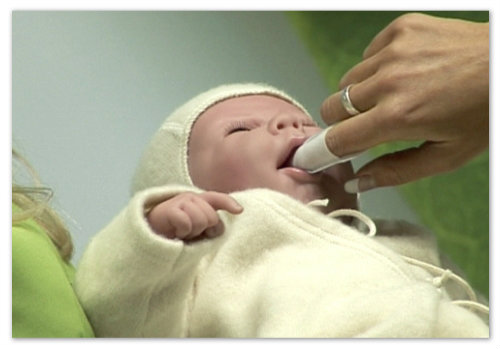
Cleaning your mouth should be done daily
It’s very easy to get rid of the smell that appears after waking up. You need to feed the baby, give him a piece of apple to chew.
Breasts smell pleasant, so the appearance of bad breath should alert parents. There is no need to panic, but you should consult a doctor.





